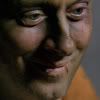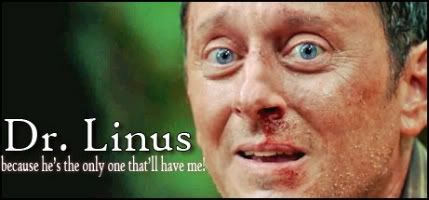Post by bobdoc on Aug 5, 2010 9:00:46 GMT -4
From theenvelope.latimes.com/news/la-en-emerson-20100805,0,1622001.story
Some people have a midlife crisis and buy a fancy car. Michael Emerson opted for a new career. And what a scary one it's been: The 55-year-old, who won an Emmy last year, has earned his fourth nomination for playing "Lost's" Benjamin Linus, a man who makes sociopaths seem endearing.
"I always thought I was supposed to be an actor, but I couldn't figure out how," the Iowa native says in his trademark gentle, perfectly punctuating voice. Eking out a paycheck as a magazine illustrator, Emerson found himself in his mid-30s in what he calls "an extreme life situation."
"I was newly divorced, all my bridges were burned and I had no way to really make a living. And I thought, 'Well, if I'm going to have to start over, I'm jolly well going to start over doing what I please.'"
Regional theater work in the South and a master's degree in drama at the age of 40 led to a critically acclaimed Broadway debut in 1999's "The Iceman Cometh" with Kevin Spacey; an Emmy-winning turn as a psycho on "The Practice" in 2001 earned him the eye of "Lost" executive producers Damon Lindelof and Carlton Cuse, who were casting what was to be a sporadic role of the leader of "The Others" for the show's second season. "Michael had something enormously rare — a fascinating combination of danger and humor," remembers Lindelof. "He was just as likely to try to make you laugh as to kill you."
Emerson was invited to join the main cast for the third season, a reward for simultaneously intriguing and confusing audiences as he found internal conflict in what might otherwise have been a textbook villain. "There were criminal acts that my character was guilty of that shocked me, but I tried to honor the writers and say, 'Then let's sell this,'" says Emerson. "I've never been one to make calls to L.A. or have powwows with the director. I just wanted to keep Benjamin in the gray zone, in the middle of good and evil and lovability and despicability, and keep the audience guessing."
The proof of his success came in Emmy nods but also in the reaction of his fans. "I'm always stopped, and people are really friendly," he says. "I think that's because the character's arc moved from sinister to, well, not lovable necessarily, but empathetic. There was a seismic shift when Benjamin lost his daughter. Or maybe they just liked the villain they knew more than the villain they didn't."
Keeping audiences guessing was "Lost's" greatest strength and weakness, depending on who's talking, down to its head-scratching finale that wound up six seasons of complicated plot twists that often left viewers searching for true meaning beneath it all. Emerson has no inside answers but says he delights in the end product. "I think I had framed the wrong questions in my head and that, like many people, I had underestimated the subtlety of the writing team, who decided not to write for easy impact but rather for art's sake. Great art has an open-endedness or is open to interpretation that is worth puzzling over. You wouldn't read 'The Brothers Karamazov' and say, 'It doesn't have a clear enough ending.' "
For Emerson, the end of the show was less bitter than sweet: Filming in Hawaii meant being separated from his wife of 12 years, actress Carrie Preston, whose role as Arlene Fowler in "True Blood" kept her in L.A. The now-reunited couple is spending the summer in New York, where they have an apartment, while Emerson considers his options. The idea of workshopping a play holds appeal, and he and "Lost" colleague and fellow supporting actor nominee Terry O'Quinn are talking about a TV project. Emerson says he's in no hurry to decide. "I do get offered damaged and dangerous characters all the time, and all I can say is, 'That's lovely, but I've done that and I'll hold out for a bit.' I just don't worry about it. If I had a taste for cruise ships and speedboats and world travel, that probably would have arisen by now."
Lindelof says he would like to see Emerson in a comedy, "as long as he tries to kill people occasionally," and Emerson doesn't disavow the idea but adds that he's not expecting his next gig to come easily. "I've never shot a pilot in my life, and I don't know if I could ever get cast as a series regular in any of the original ways. It's never worked, so I don't hold out hope for the frontal assault. I've always come in through the back door." Wouldn't winning a third Emmy change that? Emerson confesses he's not putting much store in it beyond the honor. "And I don't think I have much of a chance to win it, but that's all right too. It really is a fine enough thing to be nominated."
"I always thought I was supposed to be an actor, but I couldn't figure out how," the Iowa native says in his trademark gentle, perfectly punctuating voice. Eking out a paycheck as a magazine illustrator, Emerson found himself in his mid-30s in what he calls "an extreme life situation."
"I was newly divorced, all my bridges were burned and I had no way to really make a living. And I thought, 'Well, if I'm going to have to start over, I'm jolly well going to start over doing what I please.'"
Regional theater work in the South and a master's degree in drama at the age of 40 led to a critically acclaimed Broadway debut in 1999's "The Iceman Cometh" with Kevin Spacey; an Emmy-winning turn as a psycho on "The Practice" in 2001 earned him the eye of "Lost" executive producers Damon Lindelof and Carlton Cuse, who were casting what was to be a sporadic role of the leader of "The Others" for the show's second season. "Michael had something enormously rare — a fascinating combination of danger and humor," remembers Lindelof. "He was just as likely to try to make you laugh as to kill you."
Emerson was invited to join the main cast for the third season, a reward for simultaneously intriguing and confusing audiences as he found internal conflict in what might otherwise have been a textbook villain. "There were criminal acts that my character was guilty of that shocked me, but I tried to honor the writers and say, 'Then let's sell this,'" says Emerson. "I've never been one to make calls to L.A. or have powwows with the director. I just wanted to keep Benjamin in the gray zone, in the middle of good and evil and lovability and despicability, and keep the audience guessing."
The proof of his success came in Emmy nods but also in the reaction of his fans. "I'm always stopped, and people are really friendly," he says. "I think that's because the character's arc moved from sinister to, well, not lovable necessarily, but empathetic. There was a seismic shift when Benjamin lost his daughter. Or maybe they just liked the villain they knew more than the villain they didn't."
Keeping audiences guessing was "Lost's" greatest strength and weakness, depending on who's talking, down to its head-scratching finale that wound up six seasons of complicated plot twists that often left viewers searching for true meaning beneath it all. Emerson has no inside answers but says he delights in the end product. "I think I had framed the wrong questions in my head and that, like many people, I had underestimated the subtlety of the writing team, who decided not to write for easy impact but rather for art's sake. Great art has an open-endedness or is open to interpretation that is worth puzzling over. You wouldn't read 'The Brothers Karamazov' and say, 'It doesn't have a clear enough ending.' "
For Emerson, the end of the show was less bitter than sweet: Filming in Hawaii meant being separated from his wife of 12 years, actress Carrie Preston, whose role as Arlene Fowler in "True Blood" kept her in L.A. The now-reunited couple is spending the summer in New York, where they have an apartment, while Emerson considers his options. The idea of workshopping a play holds appeal, and he and "Lost" colleague and fellow supporting actor nominee Terry O'Quinn are talking about a TV project. Emerson says he's in no hurry to decide. "I do get offered damaged and dangerous characters all the time, and all I can say is, 'That's lovely, but I've done that and I'll hold out for a bit.' I just don't worry about it. If I had a taste for cruise ships and speedboats and world travel, that probably would have arisen by now."
Lindelof says he would like to see Emerson in a comedy, "as long as he tries to kill people occasionally," and Emerson doesn't disavow the idea but adds that he's not expecting his next gig to come easily. "I've never shot a pilot in my life, and I don't know if I could ever get cast as a series regular in any of the original ways. It's never worked, so I don't hold out hope for the frontal assault. I've always come in through the back door." Wouldn't winning a third Emmy change that? Emerson confesses he's not putting much store in it beyond the honor. "And I don't think I have much of a chance to win it, but that's all right too. It really is a fine enough thing to be nominated."










